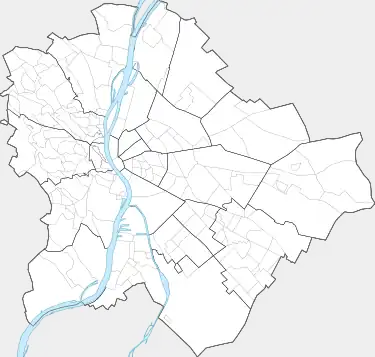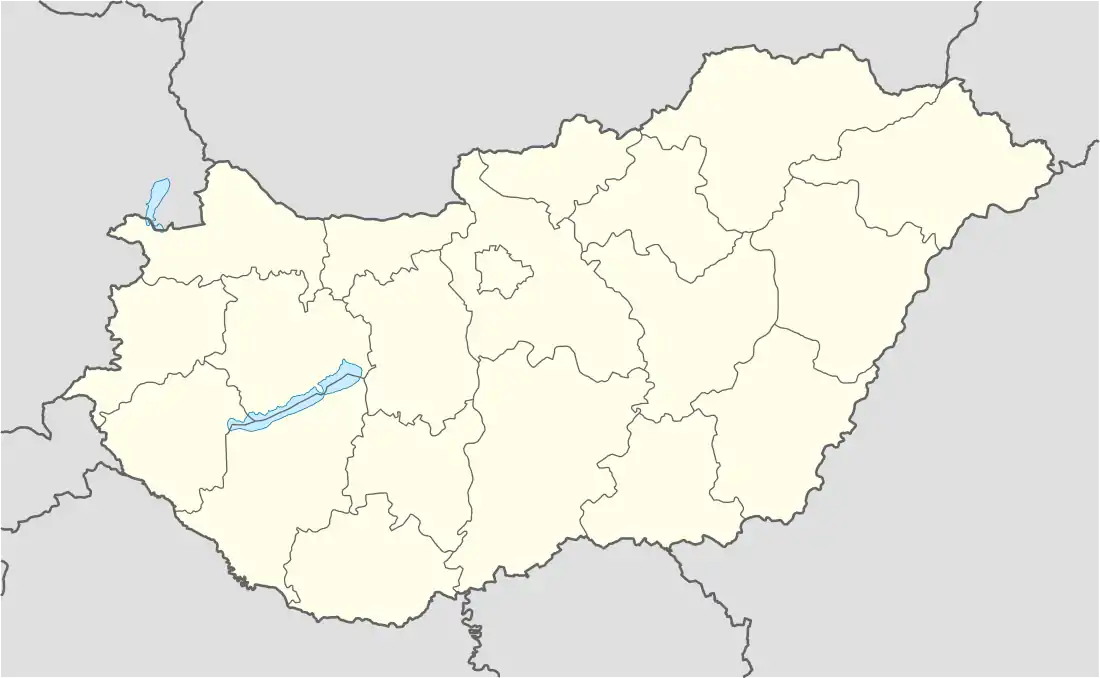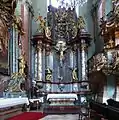| Church of Stigmatisation of Saint Francis of Assisi Szent Ferenc sebei templom | |
|---|---|
%252C_Budape%C5%A1%C5%A5_0754.jpg.webp) Distant view of the church | |
| Religion | |
| Affiliation | Roman Catholic |
| Year consecrated | 1757 |
| Location | |
| Location | Fő Street,[1] Várkerület (Buda Castle District), Buda, Budapest, Hungary |
 Shown within Budapest  Church of Stigmatisation of Saint Francis (Hungary) | |
| Geographic coordinates | 47°30′26″N 19°02′18″E / 47.507344°N 19.038311°E |
| Architecture | |
| Architect(s) | Hans James |
| Type | Church |
| Style | Baroque |
| Groundbreaking | 1703 |
| Completed | 1731 |
The Church of Stigmatisation of Saint Francis (Hungarian: Szent Ferenc sebei templom) is a Catholic Church built in the mid-18th century, in the Baroque style, located in Buda, Budapest, in the immediate vicinity of the Batthyány tér square.
History
During the Turkish occupation of Buda, the Pashtun Magtúl Mustafa (Sokollu Mustafa Pasha) mosque and türbe stood here. This complex was built by the famous 16th century architect Mimar Sinan.[1][2] The complex may or may not have survived the siege of Buda in 1686.[3]
The spiritual care of Catholic believers was carried out from the middle of the 17th century by Bosnian Franciscan monks, who remained in the city after the Habsburg recapture of Buda in 1686. In 1703, the construction of a monastery and church began. The architect was Hans James.[1] The foundation stone of the present church was laid in 1731 and consecrated in 1757 by Károly Zbiskó.[1] Most of the Baroque items that are still visible today (altars, pulpit and benches) were made by the monks' own workshop.
However, according to a decree of Joseph II, Holy Roman Emperor, it had to be handed over in 1785 to the sisters of Saint Elizabeth of the House of Árpád who arrived from Vienna, who transformed the monastery into a hospital.[4] They continued in the nursing service for "unsupervised patients" until 1950. After that, 69 nurses had to leave for the newly established hospital and nursing home. [2] This facility was operated until 1990. Today, the hospital is run by a Maltese charity known as the Care Home for the Elderly.
The church has been in use since 1989 by the priests of German-speaking Catholics in Budapest.
Architecture
The rich ornamentation of the interior of the church is mainly the work of Franciscan artists from the 18th century.[1]
Gallery
 Rear facade
Rear facade Tower
Tower Bell tower
Bell tower Bishop Saint Louis statue
Bishop Saint Louis statue Pulpit with the evangelists, made in 1752
Pulpit with the evangelists, made in 1752 Altar of the blessed saints, made in 1742
Altar of the blessed saints, made in 1742 Saint Anne painting
Saint Anne painting Side altar of the Holy Cross
Side altar of the Holy Cross Altar of Saint Florian, made in 1740
Altar of Saint Florian, made in 1740 Baroque carved benches
Baroque carved benches
References
- 1 2 3 4 5 "Szent Ferenc Sebei Templom". Archbishop of Esztergom website (in Hungarian).
- ↑ Yilmaz, Mehmet Emin. (2021). Sokollu Mustafa Pasa'nin Budin'deki Camileri ve Mescitleri. In Bayram, B. et al. (ed). Bildiri Kitabi. Ahmet Yesevi Üniversitesi. pp. 743-762.
- ↑ Ozguven, Burcu. (1999) A Beylerbeyi from Budin: Sokollu Mustafa. In Fafescioglu, C. & Thys-Senocak, L. (ed). Aptullah Kuran Icin Yazilar: Essays in Honour of Aptullah Kuran. YKY Istanbul. pp. 253-263.
- ↑ Imre Vizler. "Budapest, Szent Ferenc Sebei templom (Erzsébet apácák temploma) (Budapest, St. Francis of the Sword Church (Elisabeth's Nuns Church))". templom.hu (in Hungarian). Archived from the original on 2016-03-04. Retrieved 2019-09-05.